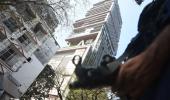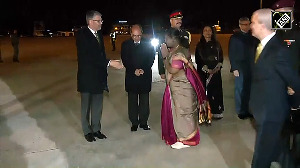The Supreme Court on Friday allowed the Centre to continue with the security cover for industrialist Mukesh Ambani and his family members in Mumbai and quashed the ongoing proceedings on a PIL on the issue before the Tripura high court.
A bench comprising Chief Justice N V Ramana and Justices Krishna Murari and Hima Kohli allowed the appeal of the central government challenging the Tripura high court's direction on a PIL saying that there was no need to entertain such a PIL when the family was paying the cost of the security.

"What is your locus and why are you bothered about the security? The government is there, they will take care. Why are you bothered... It is somebody's security," said the bench while questioning the counsel for the PIL petitioner Bikash Saha who had moved to the high court.
Senior advocate Harish Salve, appearing for the family, said the plea challenging the grant of security cover is ”unfortunate” and the family has been paying for it.
The bench took note of the submissions and said that there was no reason to allow the high court proceedings to continue.
Solicitor General Tushar Mehta, appearing for the Centre, had said that the PIL petitioner (Saha) in Tripura has nothing to do with the security of individuals provided in Mumbai.
The Tripura high court had on a PIL filed by one Bikash Saha passed two interim orders on May 31 and June 21 and directed the central government to place the original file maintained by the ministry of home affairs (MHA) regarding the threat perception and assessment report of Ambani, his wife and children based on which security has been granted to them.
Mehta had earlier said that the high court had no jurisdiction to entertain the PIL as the state government has nothing to do with the security cover provided to the Ambanis by the Centre on the recommendation of the Maharashtra government.
The Centre in its appeal has said that vide the said orders, the high court has also directed the central government to depute a responsible officer to appear before it (high court) with the original record, in a sealed cover, on the next date of hearing on June 28, 2022, for consideration of the court.
"It is respectfully submitted that the aforesaid order has been passed by the High Court in a PIL filed by an individual person who had no locus in the matter and was just a meddlesome interloper, claiming himself to be a social activist and student by profession," it said.
"Thus, in the respectful submission of the petitioner, the very indulgence of the high court to judicially review the decision of the central government to provide security cover to some of the respondents suffers from patent and manifest errors of law and is perverse requiring interference of this court," it has said.
"It was further pointed out to the high court that, based on the threat report obtained by the security forces, ‘Z+' category security was given to respondent No.2 (Mukesh Ambani) in 2013 and ‘Y+' category CRPF cover was given to respondent No.3 (Neeta Ambani) in 2016. It was also pointed out to the high court that both the security covers to respondents 2 & 3 were given on the basis of inputs and assessment reports received from intelligence and investigation units and the expense for giving such security was also duly borne by the said two respondents," it has said.
The government has said that while entertaining the PIL petition the high court had failed to appreciate that Mukesh Ambani and his families were neither residents of Tripura nor any part of the cause of action remotely arising from Tripura existed.
"Thus, the high court had no territorial jurisdiction or subject matter jurisdiction over the matter. It is further submitted that respondents 2-6 (Mukesh Ambani, his wife, and children), admittedly are residents of Mumbai, and the place where the decision-making process of whether to provide them with security or not was taken, inter-alia, is in New Delhi. Therefore, the territorial jurisdiction of the state of Tripura was completely alien to the subject matter of the petition," it has said.
The government has said that despite the same the high court has directed the production of the original file regarding the threat perception and assessment report of the said respondents for access when it had no territorial jurisdiction or any legal basis to make such an order.
”Therefore, the interim orders passed by the high court are completely without jurisdiction and unsustainable in the eyes of law and thus liable to be set aside,” it has said.











 © 2025
© 2025